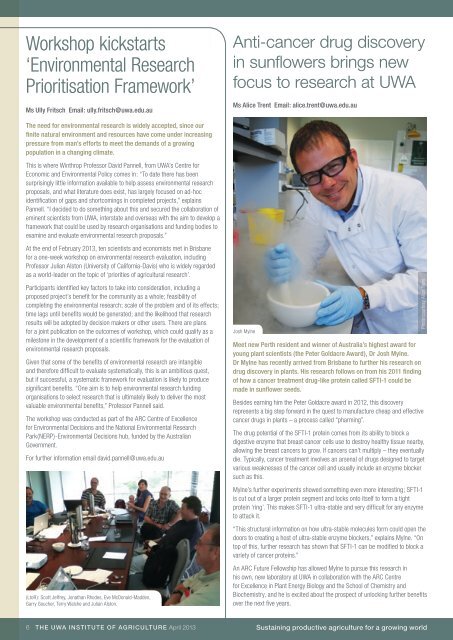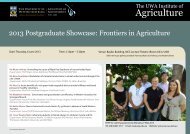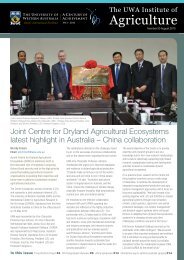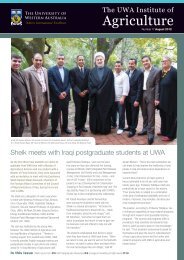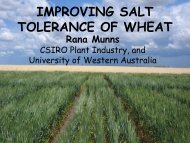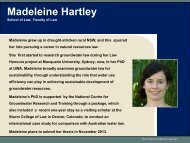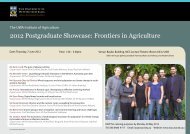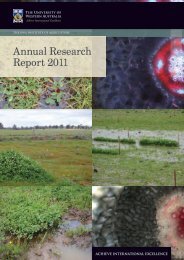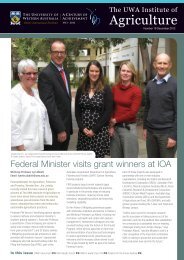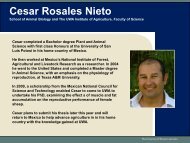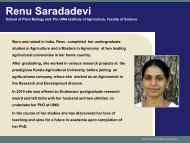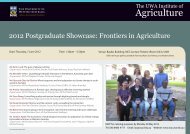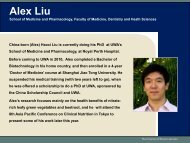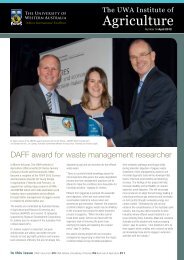Download - The UWA Institute of Agriculture - The University of ...
Download - The UWA Institute of Agriculture - The University of ...
Download - The UWA Institute of Agriculture - The University of ...
You also want an ePaper? Increase the reach of your titles
YUMPU automatically turns print PDFs into web optimized ePapers that Google loves.
Workshop kickstarts<br />
‘Environmental Research<br />
Prioritisation Framework’<br />
Ms Ully Fritsch Email: ully.fritsch@uwa.edu.au<br />
Anti-cancer drug discovery<br />
in sunflowers brings new<br />
focus to research at <strong>UWA</strong><br />
Ms Alice Trent Email: alice.trent@uwa.edu.au<br />
<strong>The</strong> need for environmental research is widely accepted, since our<br />
finite natural environment and resources have come under increasing<br />
pressure from man’s efforts to meet the demands <strong>of</strong> a growing<br />
population in a changing climate.<br />
This is where Winthrop Pr<strong>of</strong>essor David Pannell, from <strong>UWA</strong>’s Centre for<br />
Economic and Environmental Policy comes in: “To date there has been<br />
surprisingly little information available to help assess environmental research<br />
proposals, and what literature does exist, has largely focused on ad-hoc<br />
identification <strong>of</strong> gaps and shortcomings in completed projects,” explains<br />
Pannell. “I decided to do something about this and secured the collaboration <strong>of</strong><br />
eminent scientists from <strong>UWA</strong>, interstate and overseas with the aim to develop a<br />
framework that could be used by research organisations and funding bodies to<br />
examine and evaluate environmental research proposals.”<br />
At the end <strong>of</strong> February 2013, ten scientists and economists met in Brisbane<br />
for a one-week workshop on environmental research evaluation, including<br />
Pr<strong>of</strong>essor Julian Alston (<strong>University</strong> <strong>of</strong> California-Davis) who is widely regarded<br />
as a world-leader on the topic <strong>of</strong> ‘priorities <strong>of</strong> agricultural research’.<br />
Participants identified key factors to take into consideration, including a<br />
proposed project’s benefit for the community as a whole; feasibility <strong>of</strong><br />
completing the environmental research; scale <strong>of</strong> the problem and <strong>of</strong> its effects;<br />
time lags until benefits would be generated; and the likelihood that research<br />
results will be adopted by decision makers or other users. <strong>The</strong>re are plans<br />
for a joint publication on the outcomes <strong>of</strong> workshop, which could qualify as a<br />
milestone in the development <strong>of</strong> a scientific framework for the evaluation <strong>of</strong><br />
environmental research proposals.<br />
Given that some <strong>of</strong> the benefits <strong>of</strong> environmental research are intangible<br />
and therefore difficult to evaluate systematically, this is an ambitious quest,<br />
but if successful, a systematic framework for evaluation is likely to produce<br />
significant benefits. “One aim is to help environmental research funding<br />
organisations to select research that is ultimately likely to deliver the most<br />
valuable environmental benefits,” Pr<strong>of</strong>essor Pannell said.<br />
<strong>The</strong> workshop was conducted as part <strong>of</strong> the ARC Centre <strong>of</strong> Excellence<br />
for Environmental Decisions and the National Environmental Research<br />
Park(NERP)-Environmental Decisions hub, funded by the Australian<br />
Government.<br />
For further information email david.pannell@uwa.edu.au<br />
(LtoR): Scott Jeffrey, Jonathan Rhodes, Eve McDonald-Madden,<br />
Garry Goucher, Terry Walshe and Julian Alston.<br />
Josh Mylne<br />
Meet new Perth resident and winner <strong>of</strong> Australia’s highest award for<br />
young plant scientists (the Peter Goldacre Award), Dr Josh Mylne.<br />
Dr Mylne has recently arrived from Brisbane to further his research on<br />
drug discovery in plants. His research follows on from his 2011 finding<br />
<strong>of</strong> how a cancer treatment drug-like protein called SFTI-1 could be<br />
made in sunflower seeds.<br />
Besides earning him the Peter Goldacre award in 2012, this discovery<br />
represents a big step forward in the quest to manufacture cheap and effective<br />
cancer drugs in plants – a process called “pharming”.<br />
<strong>The</strong> drug potential <strong>of</strong> the SFTI-1 protein comes from its ability to block a<br />
digestive enzyme that breast cancer cells use to destroy healthy tissue nearby,<br />
allowing the breast cancers to grow. If cancers can’t multiply – they eventually<br />
die. Typically, cancer treatment involves an arsenal <strong>of</strong> drugs designed to target<br />
various weaknesses <strong>of</strong> the cancer cell and usually include an enzyme blocker<br />
such as this.<br />
Mylne’s further experiments showed something even more interesting; SFTI-1<br />
is cut out <strong>of</strong> a larger protein segment and locks onto itself to form a tight<br />
protein ‘ring’. This makes SFTI-1 ultra-stable and very difficult for any enzyme<br />
to attack it.<br />
“This structural information on how ultra-stable molecules form could open the<br />
doors to creating a host <strong>of</strong> ultra-stable enzyme blockers,” explains Mylne. “On<br />
top <strong>of</strong> this, further research has shown that SFTI-1 can be modified to block a<br />
variety <strong>of</strong> cancer proteins.”<br />
An ARC Future Fellowship has allowed Mylne to pursue this research in<br />
his own, new laboratory at <strong>UWA</strong> in collaboration with the ARC Centre<br />
for Excellence in Plant Energy Biology and the School <strong>of</strong> Chemistry and<br />
Biochemistry, and he is excited about the prospect <strong>of</strong> unlocking further benefits<br />
over the next five years.<br />
Photo courtesy Alice Trent<br />
6 THE <strong>UWA</strong> institute <strong>of</strong> agriculture April 2013 Sustaining productive agriculture for a growing world


